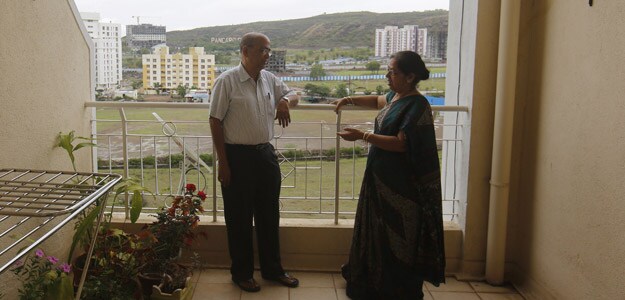For some people, their job is not just work, it is a calling.

Working into old age has many potential benefits
HIGHLIGHTS
- For some, work is not simply a job but a calling
- Working into old age has many potential benefits
- Occupational living will is important for those who do not wish to retire
My wife says I love my work too much to ever retire. Perhaps she's right. But my experiences as a neurologist and clinical director of an Alzheimer center have led me to think a lot about the circumstances under which it would be wise to move on. In fact, having reached my 60s -- joining the fastest-growing segment of our population -- I've been considering what changes in my cognitive capacity would lead me to no longer wish to keep on working.
More specifically, I've begun to develop an "occupational living will," something akin to a medical advanced directive but expressly intended for one's professional life. Some recent encounters with patients at our center have convinced me of its value and potential urgency.
When I was a young physician, I noticed there were always a few older, formerly very accomplished doctors who would consistently stand up during important meetings and make irrelevant comments that caused me and others to cringe. If I helped to take care of their patients, I was often struck by the mediocre treatment they were providing. We youthful colleagues remained oblivious to the possibility that their fate could ever become ours.
Since then I've helped care for many previously high-functioning professionals with progressive dementing illnesses. Depending on the stage of the disease and the degree of disruption of brain systems important for self-awareness, patients have widely varied insight into their predicament and appreciation of the impact of their neurological disease on their work.
This lack of self-awareness was disturbingly evident in the case of a professor in her mid-60s who continued to give lectures, supervise students and even consult, despite being diagnosed with Alzheimer's disease of mild to moderate severity.
When strong cognitive-testing evidence of her deteriorating mental status and examples of her difficulty carrying out professional responsibilities were brought to her attention, she insisted her problems were minor. Sadly, these "minor problems" included delivering the same prepared lecture to her class twice in one week and the recurring loss of bowel control, even during interactions with students.
For many of us, including this professor, work is not simply a job but a calling. We may experience giving up work as losing our selves, or at least a big chunk of who we are. Members of my own profession are well known for their commitment to their work, so it's not surprising that almost 30 percent of active U.S. physicians are over 60.
Working into old age has many potential benefits. The intellectual and social stimulation derived from continuing to work as we grow old is very likely to promote brain health and counteract cognitive decline. The accumulated knowledge and experience of seasoned workers benefit companies and organizations, and may help offset future personnel shortages. Many of my older colleagues continue to be amazing sources of clinical wisdom and expertise.
Nonetheless, by the time we reach our 60s, most of us have developed some concerns about losing our cognitive faculties. An estimated 15 percent to 20 percent of adults ages 65 and older suffer from mild cognitive impairment and 10 percent from dementia.
Despite fears about possible mental declines, few of us have generated concrete strategies for addressing them. Like other unpleasant possibilities, we tend to avoid thinking about them. For example, all of us will die, but more than half of us have not written a will.
Moreover, most Americans have not designated a health-care proxy to speak on their behalf if illness silences their ability to do so for themselves. Few have had discussions with loved ones exploring under what circumstances they would want modern medical science to step back from prolonging the dying process.
I suggest that an occupational living will is particularly important for adults approaching their 60s or beyond, especially those with no intention of retiring. This exercise would provide an opportunity to seriously consider our individual threshold of cognitive or functional decline that, if crossed, would signal the need to stop working. One extreme position would be to choose to retire when we could no longer perform at a level equal to our highest degree of competence and creativity. The other extreme would be to plan to work until the day we die, regardless of our intellectual capacity, performance or ability to contribute.
Between these extremes is the exemplary course of action demonstrated by another one of my patients, also a professor in her mid-60s. She was evaluated for mild but disruptive cognitive difficulties (slow recall of information), and a neurological work-up revealed underlying Alzheimer's disease.
She shared her diagnosis with close colleagues in her department and continues to teach, but with the support of other faculty members. Co-teaching classes, a lighter workload and written notes have provided a meaningful scaffolding for her to continue to offer her expertise to her students.
With the backing of our clinical team, she asked colleagues to monitor her performance and will use their feedback to guide future decisions about work.
Her example has led to an evolution of my thinking. I am no longer focused solely on determining a threshold for my eventual retirement. I also seek to lay the groundwork for handling a period of gradual mental decline and deterioration in my ability. This will probably entail the development of a transitional plan consisting of accommodations, increased support and diminished responsibilities, similar to those adopted by my proactive patient.
No blueprint exists to guide me, so I've broken down this seemingly overwhelming task into manageable steps:
1. Crafting a written document articulating advanced directives for work that represent a personal commitment to how, depending on my cognitive status, I would want to comport myself in the future.
2. Sharing the document with others I trust who can support me through this process.
3. Recording a video that communicates my wishes and can be used to speak to my future self.
4. Identifying a few peers or colleagues I can confide in, who can access my work and make a fair and reasonable assessment of my functioning.
5. Explicitly empowering these individuals to share their observations with me.
6. Finally, if concerns are raised, having a plan in place for evaluating -- via formal assessment by a cognitive neurologist or geriatric psychiatrist -- whether my decline exceeds the bounds of normal aging and is truly worrisome.
An occupational living will would not be legally binding. There is a fundamental difference between medical and professional advanced directives. Medical advanced directives are created for circumstances in which we can no longer speak for ourselves. In contrast, when we reach the point when our advanced directives for work should be carried out, we will still have a voice and will be able to alter our plans, moving the goal posts of when to retire further down the road.
This raises the most daunting challenge of all: finding ways to ensure that we will abide by our previous commitments, made while in full control of our mental faculties. No doubt we will need strong support from the individuals with whom we shared our advanced directives to remind us of our previously stated intentions and highlight the stark choices we now face.
This whole topic is very sobering. But I remind myself that I don't want to be that older physician who provides a low standard of care to patients, embarrasses himself in front of colleagues or sullies the reputation he has built over decades.
I have thus been engaging in an animated inner dialogue to counter my own rationalizations for avoiding this process.
"Cognitive decline or dementia won't happen to me," I tell myself. Yet brain health is not guaranteed even when doing everything to reduce the risk, including exercising, eating well and staying mentally active.
"I'll know when I'm declining and deal with it then," I halfheartedly assure myself. Unfortunately, all too often I have seen how brain disease has robbed my patients of their previous capacity for insight and self-awareness.
"If there's a problem, my colleagues, friends or family will let me know." Maybe. But if we have been powerful individuals in our field, our loved ones or more junior colleagues may generate excuses for our difficulties or be too afraid to speak the truth.
"If I decline enough to make costly, dangerous mistakes, the decision about retirement will be made for me." Sure, but is that really the way I want to finish my career? For me, the answer is a simple but resounding no.
So, despite my ongoing apprehension, I have begun to confront the possibility of future cognitive impairment. This has summoned me to reflect on what I care most about in my professional life and to seek ways to help ensure that my values, intentions and standards for work prevail, should this grim possibility become a reality. I invite others to join me in this process. If we're lucky, we won't have to remember to thank ourselves in the future.
- Daffner is the Wimberly Professor of Neurology at Harvard Medical School and the Muss Clinical Director of the Alzheimer Center at Brigham and Women's Hospital.
(This story has not been edited by NDTV staff and is auto-generated from a syndicated feed.)
DoctorNDTV is the one stop site for all your health needs providing the most credible health information, health news and tips with expert advice on healthy living, diet plans, informative videos etc. You can get the most relevant and accurate info you need about health problems like diabetes, cancer, pregnancy, HIV and AIDS, weight loss and many other lifestyle diseases. We have a panel of over 350 experts who help us develop content by giving their valuable inputs and bringing to us the latest in the world of healthcare.














